模联mpc新闻报道
高中生为何热衷于参加各类模拟联合国活动?

1. 高中生是人生的重要阶段,他们面临着许多选择和挑战。
在这个关键时期,为什么许多高中生热衷于参加各类模拟联合国活动呢?2. 首先,参加模拟联合国活动可以提供一个宝贵的学习机会。
通过模拟联合国活动,学生能够了解国际事务、国际组织和国际关系等重要知识。
他们可以扮演不同国家的代表,通过辩论和协商来解决现实世界中的问题。
这种经历可以帮助学生提升他们的知识水平和思维能力。
3. 其次,参加模拟联合国活动可以培养学生的领导能力和团队合作精神。
在模拟联合国活动中,学生需要与其他代表进行合作,制定共同的解决方案。
他们需要展示自己的领导才能,同时也需要学会倾听和尊重他人的意见。
通过这种合作和交流,学生可以更好地理解团队合作的重要性,并提升他们的领导能力。
4. 此外,参加模拟联合国活动可以培养学生的批判性思维和问题解决能力。
在活动中,学生需要分析复杂的国际问题,并提出解决方案。
他们需要考虑不同国家的利益和观点,并通过辩论来寻求共识。
这种思考和分析的过程可以培养学生的批判性思维和问题解决能力,帮助他们成为有能力解决实际问题的人。
5. 另外,参加模拟联合国活动还可以帮助学生建立广泛的人际关系。
在活动中,学生可以结识来自不同学校和不同地区的人,与他们交流并建立联系。
这种社交经历可以帮助学生扩大自己的人脉圈,为将来的发展打下基础。
6. 最后,参加模拟联合国活动也可以帮助学生发展自信心和表达能力。
在活动中,学生需要在公众面前演讲和辩论,表达自己的观点和意见。
这种经历可以帮助他们克服公众演讲的恐惧,提升自己的表达能力和自信心。
7. 综上所述,高中生热衷于参加各类模拟联合国活动有很多原因。
这些活动为他们提供了宝贵的学习机会,培养了他们的领导能力和团队合作精神,锻炼了他们的批判性思维和问题解决能力,并帮助他们建立了广泛的人际关系。
此外,参加这些活动还可以帮助他们发展自信心和表达能力。
因此,模拟联合国活动对高中生的发展起着重要的促进作用。
模拟联合国发言稿
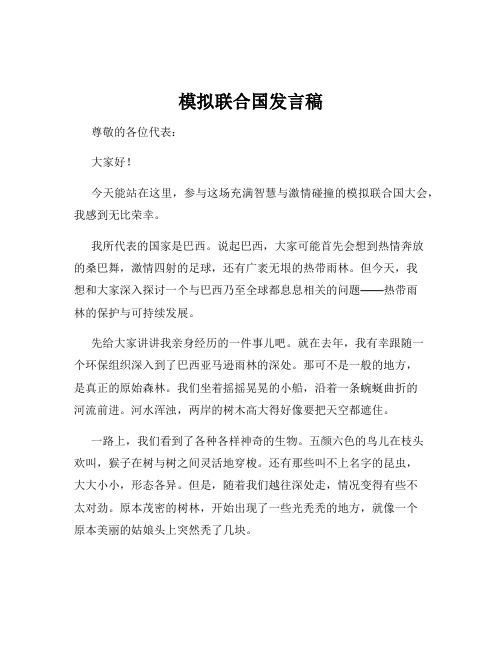
模拟联合国发言稿尊敬的各位代表:大家好!今天能站在这里,参与这场充满智慧与激情碰撞的模拟联合国大会,我感到无比荣幸。
我所代表的国家是巴西。
说起巴西,大家可能首先会想到热情奔放的桑巴舞,激情四射的足球,还有广袤无垠的热带雨林。
但今天,我想和大家深入探讨一个与巴西乃至全球都息息相关的问题——热带雨林的保护与可持续发展。
先给大家讲讲我亲身经历的一件事儿吧。
就在去年,我有幸跟随一个环保组织深入到了巴西亚马逊雨林的深处。
那可不是一般的地方,是真正的原始森林。
我们坐着摇摇晃晃的小船,沿着一条蜿蜒曲折的河流前进。
河水浑浊,两岸的树木高大得好像要把天空都遮住。
一路上,我们看到了各种各样神奇的生物。
五颜六色的鸟儿在枝头欢叫,猴子在树与树之间灵活地穿梭。
还有那些叫不上名字的昆虫,大大小小,形态各异。
但是,随着我们越往深处走,情况变得有些不太对劲。
原本茂密的树林,开始出现了一些光秃秃的地方,就像一个原本美丽的姑娘头上突然秃了几块。
我们上岸后,走进森林里面。
脚下的土地不再像之前那样松软潮湿,而是变得干燥坚硬。
空气中弥漫着一股烧焦的味道,那是树木被砍伐后焚烧留下的痕迹。
我看到巨大的树木横七竖八地倒在地上,有的还在冒着烟,仿佛在向我们哭诉着它们的遭遇。
那些砍伐树木的人,他们的手段极其粗暴。
电锯的轰鸣声震耳欲聋,一棵棵百年大树在瞬间倒下。
他们根本不在乎这些树木对于生态环境的重要性,只想着尽快把木材运出去,换成金钱。
在一处砍伐现场,我看到了一只小猴子,它在一棵倒下的树上不知所措地蹦跳着,眼神里充满了恐惧和迷茫。
它的家园就这样被无情地摧毁了,而它却无能为力。
这让我感到无比的痛心和愤怒。
亚马逊雨林是地球上最重要的生态系统之一,它不仅为无数的生物提供了栖息地,还在调节全球气候方面发挥着至关重要的作用。
可是,由于人类的过度砍伐和开垦,雨林的面积正在以惊人的速度减少。
回到现实,我们不得不思考,如何才能有效地保护这片珍贵的雨林呢?首先,政府应该加强监管,加大对非法砍伐和开垦的打击力度。
浅谈模联

浅谈模联浅谈模联序:自从上了高中,你每逢节假日甚至是周末一定会经常看见一群身着西装的同龄人出入于各大学校,你是否好奇他们是谁?他们是干什么的?现在我可以解答你的问题:他们有一个总称——模联人。
下面进入正文:1.模联简介模拟联合国(Model United Nations),简称模联(MUN),是对联合国大会和其它多边机构的仿真学术模拟,是为青年人组织的公民教育活动。
在活动中,青年学生们扮演不同国家或其它政治实体的外交代表,参与围绕国际上的热点问题召开的会议。
代表们遵循议事规则,在会议主席团的主持下,通过演讲来阐述观点,为了“国家利益”辩论、磋商、游说。
他们与友好的国家沟通协作,解决冲突;通过写作决议草案和投票表决来推进国际问题的解决。
2.模联专业术语BG:BackgroundGuide 背景文件背景指导是一份关于会议即将讨论议题的调研报告,一般由会议主席团撰写,并在会前分发给各国代表。
PP:Position Paper立场文件一份针对委员会即将讨论议题的国家立场阐述文件,需要代表在会前书写完成并提交至主席团。
WP:Working Paper 工作文件一份由部分国家代表或某一利益集团提出的关于如何解决问题的想法的文件。
通常是一份决议草案的雏形。
DD:Draft Directive 指令草案指令草案是针对危机处理的文件。
指令草案的表决通过标志着危机的成功解决。
指令草案由行动性条款构成。
指令草案的行动措施要立即、有效,避免长远规划。
代表可以对指令草案提出修正案,其中,非友好修正案也需要表决。
DR:Draft Resolution 决议草案决议草案是由代表草拟、为委员会所讨论的议题寻求解决方案的一种文件格式。
如果被投票通过,那么决议草案就成为正式决议。
在一个委员会中,有关同一个议题的决议草案只能通过一份。
Cs:Crisis 危机危机是会议进行当中,各国代表需要立即处理的突发性事件。
模联会议中的危机一般由主席团在会前设置好,事件可能与代表们讨论的议题相关。
模联基本内容介绍

模拟联合国模拟联合国(Model United Nations)简称MUN是模仿联合国及相关的国际机构,依据其运作方式和议事原则,围绕国际上的热点问题召开的会议。
青年学生们扮演不同国家的外交官,作为各国代表,参与到“联合国会议”当中。
代表们遵循大会规则,在会议主席团的主持下,通过演讲阐述“自己国家”的观点,为了“自己国家”的利益进行辩论、游说,他们与友好的国家沟通协作,解决冲突;他们讨论决议草案,促进国际合作;他们在“联合国”的舞台上,充分发挥自己的才能。
目录起源发展主要流程意义起源虽然对模拟联合国活动其起源没有确切的历史记载,但普遍公认这项活动起源于美国哈佛大学。
在联合国成立之前,就有一批学生活跃在校园里,他们对国际组织、对国际政治充满了浓厚的兴趣。
活跃的哈佛学子在积极活动的同时探索出新的形式。
他们开始模拟不同国家的外交官,参照国际联盟的议事程序讨论国际问题。
后来联合国成立,这样一种模拟会议的形式被保留下来,并逐步发展成熟,形成了模拟联合国活动。
经过60多年的发展,模拟联合国活动现在已经风靡全世界,形式多样,规模不一,有国际大会、全国大会,还有地区级和校际间的大会,参与者有大学生到高中生,乃至初中生。
同时,模拟联合国活动已经不仅仅是对联合国机构的模拟,它还包括对其他全球或地区性多边组织,政府内阁,国际论坛等组织或者会议的模拟。
目前全世界每年有近四百个国际模拟联合国大会在五大洲的50多个国家召开。
每年参与大会的师生来自世界100多个国家,总人数超过四百万人。
发展概况模拟联合国活动源自美国,在美国发展的也最为成熟。
全美各地的中学和大学都有模拟联合国活动。
其中哈佛全美模拟联合国大会(Harvard National Model United Nations Conference, HNMUN)是美国历史最悠久、规模最大、影响最深远的模拟联合国大会,委员会有近30个,参与人数近3000人。
哈佛全美模拟联合国大会的组织者全部为哈佛在校学生,他们的专业态度与敬业精神值得称赞,主席团针对议题书写的背景材料达三四十页,卓越的学术标准是其他大会不可比拟的。
模联是什么 社团培训

再科普一下模联中的英文缩写简称(尽可能 记住不然的话会被鄙视的……)
• • • • • • • •
• • • • •
MUN(Model United Nationals)模拟联合国 CORE 危及联动学术核心 CDC(Conference Directive Center)会议指导中心 BG(Background Guide)背景文件 DR(Draft Resolution)决议草案 BD (Best Delegate)最佳代表 OD(Outstanding Delegate)杰出代表 MPC(Main Press Center)危及联动主新闻中心,也常 作为模联会场记者角色的代称 SC(Security Council)安理会 (Supreme Court)最高法院 HRC(Human Rights Council)联合国人权理事会 ISIS 伊拉克和大叙利亚伊斯兰国 极端恐怖组织 CIA 美国中央情报局(国际) FBI美国联邦调查局(国内)
交流 Communication
一、演讲技巧
开场演讲
开篇演讲承担的是表明国家基本立场和态度的任务,有很重要的作用,是可以全篇 提前准备好的一篇演讲。它应当包括以下内容: l 简要介绍议题在本国的历史 l 议题的当前形势 l 本国的基本立场及其原因(如宗教理念) l 本国在国家集团中的位置 l 联合国及成员国过去采取的行动 l 可能的对于决议草案的建议和目标 l 如果有关,非政府组织的作用 l 是否存在谈判空间 这篇演讲通常被认为与立场文件有许多类似之处。不过不是简单的宣读立场文件。 这就要求代表在语言和安排上多下一些功夫。
规则与流程 Rules And Procedures
2、工作文件
工作文件是达成基本共识的几个国家在会议进程中共同撰写的文件。它的内容包括针 对所讨论议题的基本立场以及解决问题的建议与措施。 简而言之,工作文件就是代表们在会议过程中通过游说与磋商所达成的基本共识 的书面表达。工作文件没有固定格式,它可以分条列出,也可以用图表等形式表达。 第一行:文件类型及编号,编号由主席决定。 第二行:委员会 第三行:议题 第四行:起草国
模联中文发言稿范文
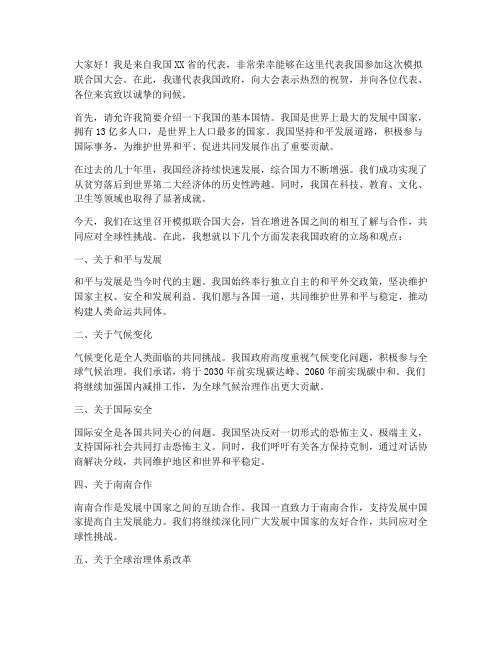
大家好!我是来自我国XX省的代表,非常荣幸能够在这里代表我国参加这次模拟联合国大会。
在此,我谨代表我国政府,向大会表示热烈的祝贺,并向各位代表、各位来宾致以诚挚的问候。
首先,请允许我简要介绍一下我国的基本国情。
我国是世界上最大的发展中国家,拥有13亿多人口,是世界上人口最多的国家。
我国坚持和平发展道路,积极参与国际事务,为维护世界和平、促进共同发展作出了重要贡献。
在过去的几十年里,我国经济持续快速发展,综合国力不断增强。
我们成功实现了从贫穷落后到世界第二大经济体的历史性跨越。
同时,我国在科技、教育、文化、卫生等领域也取得了显著成就。
今天,我们在这里召开模拟联合国大会,旨在增进各国之间的相互了解与合作,共同应对全球性挑战。
在此,我想就以下几个方面发表我国政府的立场和观点:一、关于和平与发展和平与发展是当今时代的主题。
我国始终奉行独立自主的和平外交政策,坚决维护国家主权、安全和发展利益。
我们愿与各国一道,共同维护世界和平与稳定,推动构建人类命运共同体。
二、关于气候变化气候变化是全人类面临的共同挑战。
我国政府高度重视气候变化问题,积极参与全球气候治理。
我们承诺,将于2030年前实现碳达峰、2060年前实现碳中和。
我们将继续加强国内减排工作,为全球气候治理作出更大贡献。
三、关于国际安全国际安全是各国共同关心的问题。
我国坚决反对一切形式的恐怖主义、极端主义,支持国际社会共同打击恐怖主义。
同时,我们呼吁有关各方保持克制,通过对话协商解决分歧,共同维护地区和世界和平稳定。
四、关于南南合作南南合作是发展中国家之间的互助合作。
我国一直致力于南南合作,支持发展中国家提高自主发展能力。
我们将继续深化同广大发展中国家的友好合作,共同应对全球性挑战。
五、关于全球治理体系改革全球治理体系改革是推动世界和平与发展的重要途径。
我国主张,应坚持共商共建共享的全球治理观,推动全球治理体系更加公正、合理、有效。
我们愿与各国一道,共同推动全球治理体系改革,为世界和平与发展作出更大贡献。
模联MPC范文
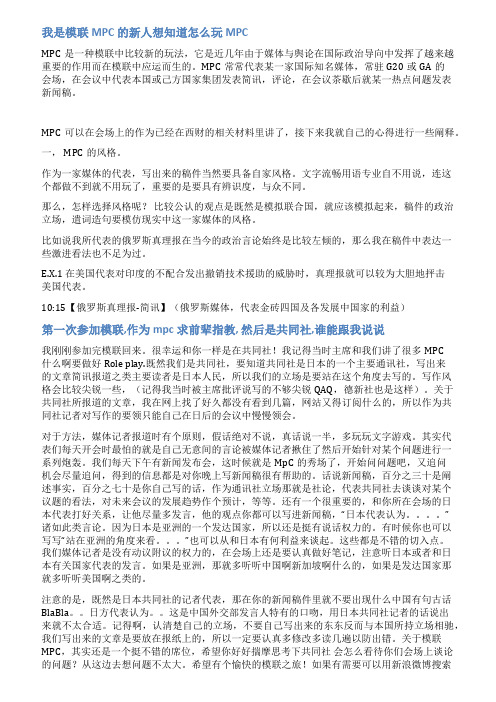
我是模联MPC的新人想知道怎么玩MPCMPC是一种模联中比较新的玩法,它是近几年由于媒体与舆论在国际政治导向中发挥了越来越重要的作用而在模联中应运而生的。
MPC常常代表某一家国际知名媒体,常驻G20或GA的会场,在会议中代表本国或己方国家集团发表简讯,评论,在会议茶歇后就某一热点问题发表新闻稿。
MPC可以在会场上的作为已经在西财的相关材料里讲了,接下来我就自己的心得进行一些阐释。
一, MPC的风格。
作为一家媒体的代表,写出来的稿件当然要具备自家风格。
文字流畅用语专业自不用说,连这个都做不到就不用玩了,重要的是要具有辨识度,与众不同。
那么,怎样选择风格呢?比较公认的观点是既然是模拟联合国,就应该模拟起来,稿件的政治立场,遣词造句要模仿现实中这一家媒体的风格。
比如说我所代表的俄罗斯真理报在当今的政治言论始终是比较左倾的,那么我在稿件中表达一些激进看法也不足为过。
E.X.1 在美国代表对印度的不配合发出撤销技术援助的威胁时,真理报就可以较为大胆地抨击美国代表。
10:15【俄罗斯真理报-简讯】(俄罗斯媒体,代表金砖四国及各发展中国家的利益)第一次参加模联,作为mpc求前辈指教, 然后是共同社,谁能跟我说说我刚刚参加完模联回来。
很幸运和你一样是在共同社!我记得当时主席和我们讲了很多MPC什么啊要做好Role play.既然我们是共同社,要知道共同社是日本的一个主要通讯社,写出来的文章简讯报道之类主要读者是日本人民,所以我们的立场是要站在这个角度去写的。
写作风格会比较尖锐一些,(记得我当时被主席批评说写的不够尖锐QAQ,德新社也是这样)。
关于共同社所报道的文章,我在网上找了好久都没有看到几篇,网站又得订阅什么的,所以作为共同社记者对写作的要领只能自己在日后的会议中慢慢领会。
对于方法,媒体记者报道时有个原则,假话绝对不说,真话说一半,多玩玩文字游戏。
其实代表们每天开会时最怕的就是自己无意间的言论被媒体记者揪住了然后开始针对某个问题进行一系列炮轰。
RTC2012主新闻中心工作指南
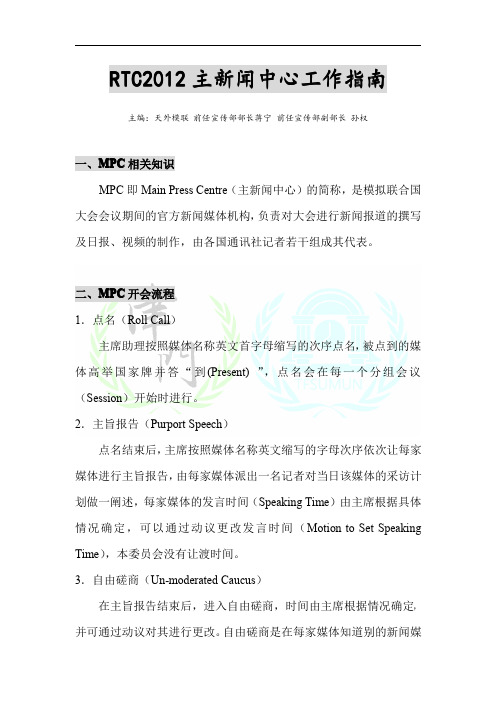
RTC201RTC20122主新闻中心工作指南主编:天外模联前任宣传部部长蒋宁前任宣传部副部长孙权一、MPC相关知识MPC即Main Press Centre(主新闻中心)的简称,是模拟联合国大会会议期间的官方新闻媒体机构,负责对大会进行新闻报道的撰写及日报、视频的制作,由各国通讯社记者若干组成其代表。
二、MPC开会流程1.点名(Roll Call)主席助理按照媒体名称英文首字母缩写的次序点名,被点到的媒体高举国家牌并答“到(Present)”,点名会在每一个分组会议(Session)开始时进行。
2.主旨报告(Purport Speech)点名结束后,主席按照媒体名称英文缩写的字母次序依次让每家媒体进行主旨报告,由每家媒体派出一名记者对当日该媒体的采访计划做一阐述,每家媒体的发言时间(Speaking Time)由主席根据具体情况确定,可以通过动议更改发言时间(Motion to Set Speaking Time),本委员会没有让渡时间。
3.自由磋商(Un-moderated Caucus)在主旨报告结束后,进入自由磋商,时间由主席根据情况确定,并可通过动议对其进行更改。
自由磋商是在每家媒体知道别的新闻媒体采访任务后,为避免采访重点重复而进行的媒体间协调,这一流程的设置是为了增强媒体间的合作意识以及商讨下的任务分配能力。
4.采访和报导(Interview and Report)自由磋商结束后,主席团宣布进入采访和报导时间,采访与报导将一直持续至当前分组会议结束。
在这段时间内,所有记者将可以自由出入会场,但每家媒体至少需有一名记者留在工作区域内MPC会场内,进行信息处理、发布及其他工作。
5.新闻发布会(News Conference)每天的分组会议暂停后由主新闻中心主持召开新闻发布会,首先播放由各家媒体制作由主席团整理发布的视频新闻;其次由各委员会派出一名主席进行会议情况简介及点评;然后,由主新闻中心记者以媒体为单位进行提问;最后,由秘书处点评当天会议。
模联立场文件参考--意大利

代表:学校:意大利西北工业大学委员会:学院:CND 电子信息学院代表:李瑞,张昌武通过反洗钱和国际司法互助增强国际禁毒合作文件意大利作为一个负责任的大国,致力于促进国际间反洗钱和禁毒合作。
毒品交易不仅影响到个人,也腐化着政府,商业以及金融等领域,而“洗钱”则助长了腐败和有组织犯罪。
意大利充分认识到毒品交易和“洗钱”的危害性,下定决心通过反洗钱和国际司法互助来增强国际禁毒合作。
《联合国禁止非法贩运麻醉药品和精神药物公约》(1988)被认为是第一个国际手段来解决犯罪中的货币收益,同时也要求成员国建立政策,将洗钱犯罪化。
为了响应对于在一个框架下来全面实施公约的需求,在1997 年,成立了全球反洗钱计划(GPML)组织,以应对犯罪组织贩卖毒品和其他相关罪行中的洗钱问题。
全球反洗钱计划因为1998年举行的联大第20 届特别会议的所得成果得到了进一步强化。
麻醉药委员会与反洗钱金融行动特别工作组合作关系密切,并出台《关于反洗钱和反资助恐怖主义及扩散融资活动的国际标准》反洗钱金融行动特别工作组制定的标准包括促进“法律、管理及执行措施的有效推行,以打击洗钱,恐怖主义融资,及其他威胁国际金融体系完整的行为。
”此前,虚拟货币运营商比特币基金会副会长查理·希瑞姆( Charlie Shrem)被控参与洗钱,并帮助向一个非法在线毒品黑市转移基金。
1月26日,希瑞姆在纽约肯尼迪机场被逮捕。
他的被捕说明了使用比特币进行非法交易是难脱离其害的,因为它涉及到软件设备中的所有权链条,每一个节点都会连接到对比特币有需求的用户。
此事件涉及范围之广,影响力之大,实为世界痛斥。
而意大利在“反洗钱”上态度十分鲜明。
就旨在防止洗钱活动上,由于梵蒂冈在反洗钱方面没有达到国际标准,意大利中央银行决定停止在梵蒂冈境内的刷卡交易业务,该业务由德意志银行意大利分行提供。
游客在梵蒂冈购买博物馆门票和在商店购物都必须用现金付款。
意大利为响应联合国的号召,做出了很多努力。
模联MPC篇

模拟联合国:MPC、学术田兴奎前言模联是一个神秘的地方,譬如有一个神奇的组织,那就是MPC,MPC有不会写简讯的菜鸟更是有着能够发挥舆论压力的恐怖主编,他们是代表的战友,也是代表的敌人,这就是MPC,MPC其实是一种模联学术范畴的支持对象,由于媒体与舆论在国际政治导向中发挥了越来越重要的作用而在模联中应运而生的。
MPC常常代表某一家国际知名媒体,常驻G20或GA 的会场,在会议中代表本国或己方国家集团发表简讯,评论,在会议茶歇后就某一热点问题发表新闻稿。
一、简介MPC是main press centre(主新闻中心)的简称,也代指主新闻中心的工作人员,即各位记者。
与其他委员会不同,MPC的参与者不是国家代表,而是每个与会国家的知名媒体,比如中国的新华社,美国的CNN 和英国的BBC,在会议中代表本国或己方国家集团发表简讯、评论,热点问题发表新闻稿等。
MPC可召开新闻发布会和发行报纸等刊物。
主新闻中心(Main Press Centre,简称MPC)始创于2009年北京大学全国中学生模拟联合国大会。
在2009年北京大学全国中学生模拟联合国大会?华南地区分会中,主新闻中心正式被引入华南地区,高质量的报道及其优秀的技术水平使其成为会议中的一大亮点,同时也强有力地推动了主新闻中心在华南各校模联中的传播与发展。
设置主新闻中心的目的,在于为模拟联合国活动营造一种更为贴近国际社会现实的氛围,同时完善模拟联合国大会的机构设置。
在营造与完善的同时,大会组委会亦希望参与其中的各位代表能够理解国际传播对于国际关系的影响,通过对主新闻中心工作的体验,能够对国际传播的理念有所体会。
二、职能1. 维护本国利益在多种国家媒体中,政府官方通讯社(如新华社)必然要维护本国利益,在会场上mpc最好与本国代表共进退,始终保持良好沟通,只有明确了本国的基本立场和利益归属,才能更好地通过舆论来维护本国利益。
而更多的西方知名媒体多以自身利益为主,有自己的政治立场偏向,不与其所在的国家立场保持一致,需要提前了解。
解密MPC要点

解密MPC地点:西南财经大学模联会议身份:驻G20的俄罗斯真理报主编MPC是一种模联中比较新的玩法,它是近几年由于媒体与舆论在国际政治导向中发挥了越来越重要的作用而在模联中应运而生的。
MPC常常代表某一家国际知名媒体,常驻G20或GA的会场,在会议中代表本国或己方国家集团发表简讯,评论,在会议茶歇后就某一热点问题发表新闻稿。
一,MPC的风格。
作为一家媒体的代表,写出来的稿件当然要具备自家风格。
文字流畅用语专业自不用说,连这个都做不到就不用玩了,重要的是要具有辨识度,与众不同。
那么,怎样选择风格呢? 比较公认的观点是既然是模拟联合国,就应该模拟起来,稿件的政治立场,遣词造句要模仿现实中这一家媒体的风格。
比如说我所代表的俄罗斯真理报在当今的政治言论始终是比较左倾的,那么在稿件中表达一些激进看法也不足为过。
E.X.1在美国代表对印度的不配合发出撤销技术援助的威胁时,真理报就可以较为大胆地抨击美国代表。
10:15【俄罗斯真理报-简讯】(俄罗斯媒体,代表金砖四国及各发展中国家的利益)本报讯:俄方对美国在会议上公然以撤销技术援助威胁某些国家支持其观点的行为表示遗憾,呼吁美国代表冷静思考,保持大国风度,追求各国基于自愿原则而非强迫的合作。
相反如人民日报这种风格较为沉稳,政治比较中立的媒体,基于中国的政治立场,就不可以随心所欲地发表这样的简讯。
当然文字的辨识度也与代表本身的文风有关,如果MPC能做到将自身文风与本媒体的风格结合起来,则一定会非常出彩,引人注目。
二,MPC的作为1.维护本国利益本国报纸必然要维护本国利益,在会场上mpc最好与本国代表共进退,始终保持良好沟通,只有明确了本国的基本立场和利益归属,才能更好地通过舆论来维护本国利益。
E.X.2俄罗斯担心就对非投资成立第三方平台会损害本国利益,所以坚决反对,于是真理报给予舆论配合。
14:00【俄罗斯真理报-简讯】本报讯:俄罗斯方面表示质疑意大利和美国方面提出的第三方平台建议。
模联前瞻性报道
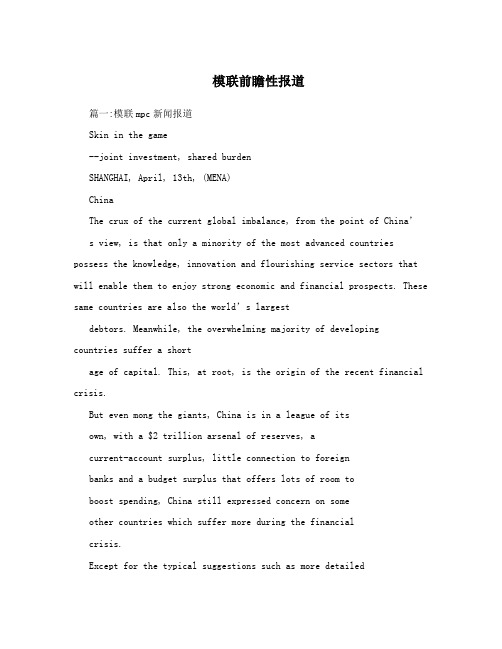
模联前瞻性报道篇一:模联mpc新闻报道Skin in the game--joint investment, shared burdenSHANGHAI, April, 13th, (MENA)ChinaThe crux of the current global imbalance, from the point of China’s view, is that only a minority of the most advanced countries possess the knowledge, innovation and flourishing service sectors that will enable them to enjoy strong economic and financial prospects. These same countries are also the world’s largestdebtors. Meanwhile, the overwhelming majority of developingcountries suffer a shortage of capital. This, at root, is the origin of the recent financial crisis.But even mong the giants, China is in a league of itsown, with a $2 trillion arsenal of reserves, acurrent-account surplus, little connection to foreignbanks and a budget surplus that offers lots of room toboost spending, China still expressed concern on someother countries which suffer more during the financialcrisis.Except for the typical suggestions such as more detailedregulations, strengthened supervision, tightercollaboration, the core call of China is the establishmentof a diversified international monetary system. In fact,multiple currencies can not only ease the dilemma offinancial situation, but can also weaken their rivals to some extent.In order to achieve such a tough goal, China advocated creating an international reserve currency that decoupled from a sovereign state,and able to keep its value long-term stability, and apart from this,China strongly suggested expanding the using range of the international monetary fund's Special Drawing Rights (SDRS). However, the topic of SDRs has been controversial during three sessions even most countries have already reached a general consensus.On the contrary, China poised a quite optimistic attitude to SDRs.The value of the SDR is based on a basket of currencies (the dollar, euro, yen and pound) that might expand one day to include the yuan,which obviously will be a good news for China.But MENA holds the view that, if the Chinese want the yuanincluded in the SDR, they will probably have to liberalise theircapital account first. That would be welcome in itself—as a shrewd lawyer would no doubt be as quick to point out as a sharp economist. Have the Chinese really considered the sacrifice that it will make, or they just regard it as a path to the refining of not only Chinese financial systems butalso the global ones?USAThough the financial crisis was global, it originated inAmerica’s uniquely fragmented financial system,overseen by a patchwork of federal and state regulators.Since recession ended in June 2009, GDP growth hasaveraged 2.8%, roughly its long-term trend. After so deepa slump, the pace is usually much faster. The gap betweenactual and potential GDP has been stuck at around 5%since late 2009 (see chart 1). From some angles, thepicture is even worse. Measured by totting up incomerather than spending, the economy is no bigger than in2006. The proportion of working-age people with jobs islower than in the trough of the recession.A little to surprise, USA agreed with the proposal of SDRs. In fact,the dollar system is so beneficial to the USA that it will never abandon it. First, the reserve-currency status of the dollar helped to create global imbalances. Surplus countries have little choice but to place most of their spare funds in the reserve currency since it is used to settle trade and has the most liquid bond market. But this allowed America’s borrowing binge and housing bubble to persist for longe r than it otherwise would have. Second, the country that issues the reserve currency faces a trade-off between domestic and international stability. Massive money-printing by the Fed to support the economy makes sense from a national perspective, but it ma y harm the dollar’s value.The explanation by the USA delegate is so selfless that it is almost willing to sacrifice itself for the sake of the stability of the global finance. MENA can’t help to doubt what’s the meaning of presence of US delegate.JapanSeen as lesson to be drawn byEuropean countries, Japansuccessfully showed the world how tostop oneself from more efficientdevelopment in the economic field.Actually, there is no financial crisis inJapan but a real economic crisis, taking a terrible toll on real economy,especiallyexport businesses. After struggling out of its “lost ten years”, Japan had nothing to fight such a storm.In spite of great losses in real economy, Japan’s financialsystems and social structure have not changed, the competence of businesses and the country itself either. With its stable financial systems, Japan is very likely to recover from present waning and further its development.Japan Government asserts that government is the core of prevention mechanism.Japan also advocates that governments should attach importance to fiscal stimulus,strengthening the governmental supervision of finance,both financial derivatives and credit rating agencies and setting up an affiliated institution for those rating agencies involved in the supervisory colleges. Japan appeals to enlarge the capital scale of IMF and other international financial institutions to assist vulnerable emerging economies and countries undergoing financial crisis.While since there are already rating agencies, MENA cannot see any necessity to setting another one, affiliated included. But Japan really has its outstanding mechanism on honest financial, and that could be point to be emphasized and what other countries can learn from.Japan is more willing to wait and see how could the DR serve its interests, but we can be sure that Japan will drag in the mud for a period in the near future.IndonesiaIndonesia suffered during the financial crisis due to its fragile economic structure, so it appealed to Strengthen the supervision of international financial system. No mater developed or developing countries must control their endless desire for fortune to build a benign international financial environment and willing to strengthen the supervision of international financial system.However, MENA thinks that Indonesia should also pay enough attention to domestic stability as a basis of healthy finance.Joint investment, shared burden can be the terminal goal of this G20 conference, but whether it will be a mere banner or a reality, that remains a doubt.Editor: XU Bingchun篇二:浅谈新闻的前瞻性浅谈新闻的前瞻性新闻是对已发生的事和刚刚发现的事,做第一时间的描述。
模拟联合国-世界粮食计划署-背景文件

2012 年 4 月
2012 年第一届北京市立新学校模拟联合国会议
不懈努力,只为追求卓越!
目录
委员会介绍· · · · · · · · · · · · · · · · · · · · · · · · · · · · · · · · · · · · · · ·2 ㈠组织机构· · · · · · · · · · · · · · · · · · · · · · · · · · · · · · ·2 ㈡机构目标· · · · · · · · · · · · · · · · · · · · · · · · · · · · · · ·3 ㈢粮食计划署的职责· · · · · · · · · · · · · · · · · · · · · · ·3 ㈣工作任务· · · · · · · · · · · · · · · · · · · · · · · · · · · · · · ·3 议题介绍· · · · · · · · · · · · · · · · · · · · · · · · · · · · · · · · · · · · · · · · ·5 ㈠饥饿概况· · · · · · · · · · · · · · · · · · · · · · · · · · · · · · ·5 ㈡什么是饥饿?· · · · · · · · · · · · · · · · · · · · · · · · · · ·6 ㈢饥饿人口由哪些人组成?· · · · · · · · · · · · · · · · ·8 ㈣饥饿的起因是什么?· · · · · · · · · · · · · · · · · · · · ·10 ㈤营养不良 · · · · · · · · · · · · · · · · · · · · · · · · · · · · · ·13 ㈥常见问题· · · · · · · · · · · · · · · · · · · · · · · · · · · · · · ·14 附录· · · · · · · · · · · · · · · · · · · · · · · · · · · · · · · · · · · · · · · · · · · · ·18 2011 年抗击饥饿地图· · · · · · · · · · · · · · · · · · · · · · · 18 立场文件提交要求· · · · · · · · · · · · · · · · · · · · · · · · · · · · · · · · ·18 参考文献· · · · · · · · · · · · · · · · · · · · · · · · · · · · · · · · · · · · · · · · ·19
模拟联合国虚拟仿真教学的实践与探索

黑龙江教育(理论与实践)
HEILONGJIANG EDUCATION(Theory & Practice)
No.8,2022 Serial No.1398
● 实践教学
模拟联合国虚拟仿真教学的实践与探索
张 行,沈仕洁
(华侨大学,福建 厦门 361021)
摘 要:虚拟仿真教学近年来成为高校课程实践改革的重要类型之一,并且逐渐从理工科专业实践应用向人文社会
家实力、外交技巧和谈判术语,以“我的课堂我做主”的翻 保护会议、人权理事会会议,以及重大历史事件多边谈判
转模式推动学生的国际政治知识建构, 这与虚拟仿真教 模拟会议等都有不错的效果。 如果学生已经普遍掌握模
学模式的互动性特征是相同的[4]。
拟联合国规则的情况下可以尝试“双重代表“ ” 多会场联动”
二、 模拟联合国实践教学的课堂设计和启示
中图分类号:G642
文献标识码:A
文章编号:1002-4107(2022)08-0088-03
虚拟仿真技术在 20 世纪 80 年代开始在社会生活中 广泛运用,由于虚拟仿真技术在逼真性、沉浸性和互动性 上的特点和优势与高校实践式教学训练高度契合。 美国 高校部分理工科专业率先把虚拟仿真技术引入大学生实 践教学设计中, 通过建立虚拟仿真实验室模拟部分学科 的高危、高消耗实训环境,保证学生在理论教学之外尽可 能提前培养实务能力。 人文社科专业对于虚拟仿真教学 的运用虽然晚于理工科专业, 但是美国一些商学院首先 建立金融投资虚拟仿真实验室, 通过计算机程序模拟基 金管理、 风险投资等实训项目辅助学生提高金融业务实 训技能。2013 年,中国教育部开始启动虚拟仿真实验教学 一流课程遴选,2014 年至 2016 年选出的首批 300 个国家 级虚拟仿真实验教学中心里,人文社科类共 36 个,占比 为 12%[1]。
模拟联合国讲话发言稿范文
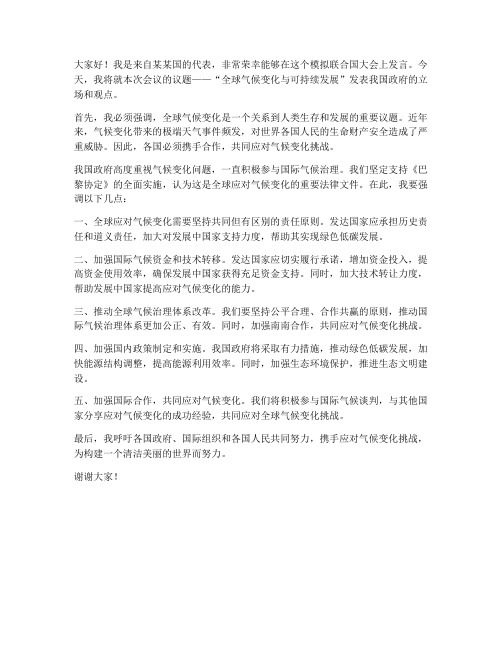
大家好!我是来自某某国的代表,非常荣幸能够在这个模拟联合国大会上发言。
今天,我将就本次会议的议题——“全球气候变化与可持续发展”发表我国政府的立场和观点。
首先,我必须强调,全球气候变化是一个关系到人类生存和发展的重要议题。
近年来,气候变化带来的极端天气事件频发,对世界各国人民的生命财产安全造成了严重威胁。
因此,各国必须携手合作,共同应对气候变化挑战。
我国政府高度重视气候变化问题,一直积极参与国际气候治理。
我们坚定支持《巴黎协定》的全面实施,认为这是全球应对气候变化的重要法律文件。
在此,我要强调以下几点:一、全球应对气候变化需要坚持共同但有区别的责任原则。
发达国家应承担历史责任和道义责任,加大对发展中国家支持力度,帮助其实现绿色低碳发展。
二、加强国际气候资金和技术转移。
发达国家应切实履行承诺,增加资金投入,提高资金使用效率,确保发展中国家获得充足资金支持。
同时,加大技术转让力度,帮助发展中国家提高应对气候变化的能力。
三、推动全球气候治理体系改革。
我们要坚持公平合理、合作共赢的原则,推动国际气候治理体系更加公正、有效。
同时,加强南南合作,共同应对气候变化挑战。
四、加强国内政策制定和实施。
我国政府将采取有力措施,推动绿色低碳发展,加快能源结构调整,提高能源利用效率。
同时,加强生态环境保护,推进生态文明建设。
五、加强国际合作,共同应对气候变化。
我们将积极参与国际气候谈判,与其他国家分享应对气候变化的成功经验,共同应对全球气候变化挑战。
最后,我呼吁各国政府、国际组织和各国人民共同努力,携手应对气候变化挑战,为构建一个清洁美丽的世界而努力。
谢谢大家!。
【优质文档】模联新闻稿-范文word版 (6页)
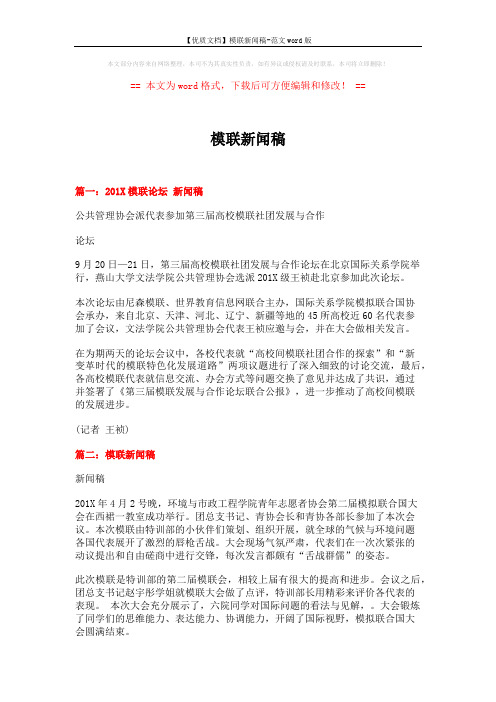
本文部分内容来自网络整理,本司不为其真实性负责,如有异议或侵权请及时联系,本司将立即删除!== 本文为word格式,下载后可方便编辑和修改! ==模联新闻稿篇一:201X模联论坛新闻稿公共管理协会派代表参加第三届高校模联社团发展与合作论坛9月20日—21日,第三届高校模联社团发展与合作论坛在北京国际关系学院举行,燕山大学文法学院公共管理协会选派201X级王祯赴北京参加此次论坛。
本次论坛由尼森模联、世界教育信息网联合主办,国际关系学院模拟联合国协会承办,来自北京、天津、河北、辽宁、新疆等地的45所高校近60名代表参加了会议,文法学院公共管理协会代表王祯应邀与会,并在大会做相关发言。
在为期两天的论坛会议中,各校代表就“高校间模联社团合作的探索”和“新变革时代的模联特色化发展道路”两项议题进行了深入细致的讨论交流,最后,各高校模联代表就信息交流、办会方式等问题交换了意见并达成了共识,通过并签署了《第三届模联发展与合作论坛联合公报》,进一步推动了高校间模联的发展进步。
(记者王祯)篇二:模联新闻稿新闻稿201X年4月2号晚,环境与市政工程学院青年志愿者协会第二届模拟联合国大会在西裙一教室成功举行。
团总支书记、青协会长和青协各部长参加了本次会议。
本次模联由特训部的小伙伴们策划、组织开展,就全球的气候与环境问题各国代表展开了激烈的唇枪舌战。
大会现场气氛严肃,代表们在一次次紧张的动议提出和自由磋商中进行交锋,每次发言都颇有“舌战群儒”的姿态。
此次模联是特训部的第二届模联会,相较上届有很大的提高和进步。
会议之后,团总支书记赵宇彤学姐就模联大会做了点评,特训部长用精彩来评价各代表的表现。
本次大会充分展示了,六院同学对国际问题的看法与见解,。
大会锻炼了同学们的思维能力、表达能力、协调能力,开阔了国际视野,模拟联合国大会圆满结束。
篇三:模联mpc新闻报道Skin in the game--joint investment, shared burdenSHANGHAI, April, 13th, (MENA)ChinaThe cru x of the current global imbalance, from the point of China’s view, is that only a minority of the most advanced countries possess the knowledge, innovation and flourishing service sectors that will enable them to enjoy strong economic and financial prospects. These same countries are also the world’s largest debtors. Meanwhile, the overwhelming majority of developing countries suffer a shortage of capital. This, at root, is the origin of the recent financial crisis.But even mong the giants, China is in a league of itsown, with a $2 trillion arsenal of reserves, acurrent-account surplus, little connection to foreignbanks and a budget surplus that offers lots of room toboost spending, China still expressed concern on someother countries which suffer more during the financialcrisis.Except for the typical suggestions such as more detailedregulations, strengthened supervision, tightercollaboration, the core call of China is the establishmentof a diversified international monetary system. In fact,multiple currencies can not only ease the dilemma offinancial situation, but can also weaken their rivals to some extent.In order to achieve such a tough goal, China advocated creating an international reserve currency that decoupled from a sovereign state,and able to keep its value long-term stability, and apart from this, China strongly suggested expanding the using range of the international monetary fund's Special Drawing Rights (SDRS). However, the topic of SDRs has been controversial during three sessions even most countries have already reached a general consensus.On the contrary, China poised a quite optimistic attitude to SDRs. The value of the SDR is based on a basket of currencies (the dollar, euro, yen and pound) that might expand one day to include the yuan, which obviously will be a good news for China.But MENA holds the view that, if the Chinese want the yuan included in the SDR, they will probably have to liberalise their capital account first. That would be welcome in itself—as a shrewd lawyer would no doubt be as quick to point out as a sharp economist. Have the Chinese really considered the sacrifice that it will make, or they just regard it as a path to the refining of not only Chinesefinancial systems butalso the global ones?USAThough the financial crisis was global, it originated inAmerica’s uniquely fragmented financial system,overseen by a patchwork of federal and state regulators.Since recession ended in June 201X, GDP growth hasaveraged 2.8%, roughly its long-term trend. After so deepa slump, the pace is usually much faster. The gap betweenactual and potential GDP has been stuck at around 5%since late 201X (see chart 1). From some angles, thepicture is even worse. Measured by totting up incomerather than spending, the economy is no bigger than in201X. The proportion of working-age people with jobs is。
模联MPC篇
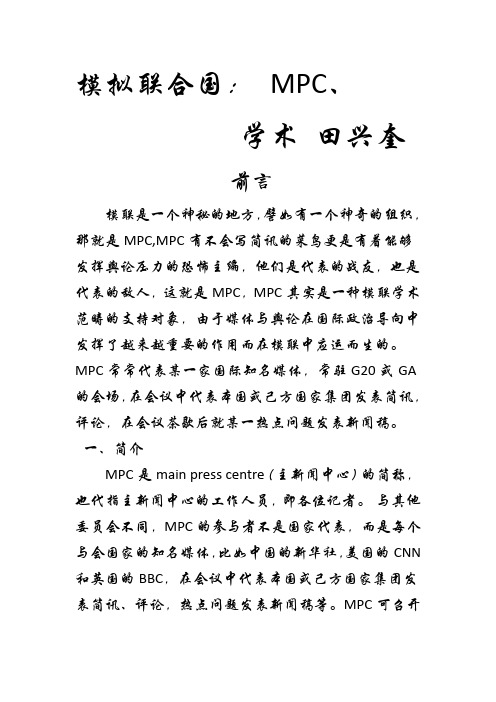
模拟联合国:MPC、学术田兴奎前言模联是一个神秘的地方,譬如有一个神奇的组织,那就是MPC,MPC有不会写简讯的菜鸟更是有着能够发挥舆论压力的恐怖主编,他们是代表的战友,也是代表的敌人,这就是MPC,MPC其实是一种模联学术范畴的支持对象,由于媒体与舆论在国际政治导向中发挥了越来越重要的作用而在模联中应运而生的。
MPC常常代表某一家国际知名媒体,常驻G20或GA 的会场,在会议中代表本国或己方国家集团发表简讯,评论,在会议茶歇后就某一热点问题发表新闻稿。
一、简介MPC是main press centre(主新闻中心)的简称,也代指主新闻中心的工作人员,即各位记者。
与其他委员会不同,MPC的参与者不是国家代表,而是每个与会国家的知名媒体,比如中国的新华社,美国的CNN 和英国的BBC,在会议中代表本国或己方国家集团发表简讯、评论,热点问题发表新闻稿等。
MPC可召开新闻发布会和发行报纸等刊物。
主新闻中心(Main Press Centre,简称MPC)始创于2009年北京大学全国中学生模拟联合国大会。
在2009年北京大学全国中学生模拟联合国大会∙华南地区分会中,主新闻中心正式被引入华南地区,高质量的报道及其优秀的技术水平使其成为会议中的一大亮点,同时也强有力地推动了主新闻中心在华南各校模联中的传播与发展。
设置主新闻中心的目的,在于为模拟联合国活动营造一种更为贴近国际社会现实的氛围,同时完善模拟联合国大会的机构设置。
在营造与完善的同时,大会组委会亦希望参与其中的各位代表能够理解国际传播对于国际关系的影响,通过对主新闻中心工作的体验,能够对国际传播的理念有所体会。
二、职能1. 维护本国利益在多种国家媒体中,政府官方通讯社(如新华社)必然要维护本国利益,在会场上mpc最好与本国代表共进退,始终保持良好沟通,只有明确了本国的基本立场和利益归属,才能更好地通过舆论来维护本国利益。
而更多的西方知名媒体多以自身利益为主,有自己的政治立场偏向,不与其所在的国家立场保持一致,需要提前了解。
模联媒体会场MPC

/601039825 Rules of Registration:
注册规则:
Each delegate has to submit an application indicating his (her) top three choices. The Dais will assign the roles of delegates according to their preferences. However, if the Dais cannot meet any one of delegates’ preference (none of three choices can be registered), the Dais will contact with the delegates as soon as possible. Delegates who haven’t submitted the preference application will be regarded to accept any result of assignment.
每位代表应提交三个驻场偏好选择,主席团成员将根据代表的选择情况分配所驻会场, 当有 代表的三项选择均不能被满足时,主席团成员将主动联系此代表进行协商。对于未提交任何 偏好申请的代表,主席团将认为其接受任何分配结果。 (DEADLINE: 23:59:59, Jan. 7th, 2013) (截止时间:2013年1月7日 23:59:59)
About this Document
This Licensing should be attached without modification while redistribution or quotation of any or all parts of the Document taking place. Please contact the original authors for supplement of Attributions if revision occurs.
模联面试自我介绍
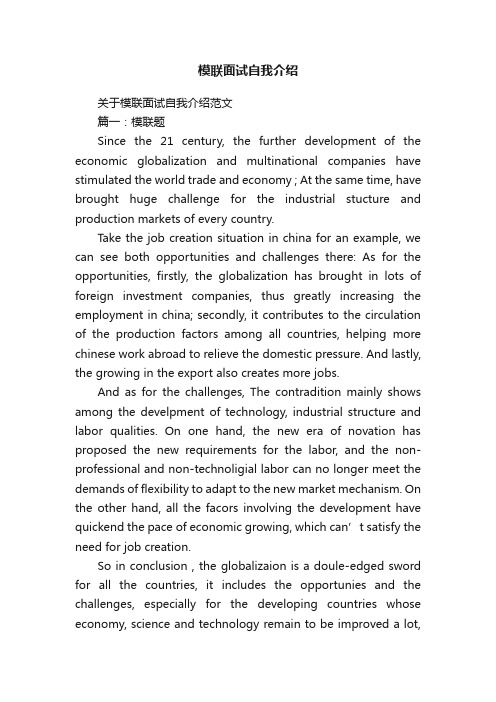
模联面试自我介绍关于模联面试自我介绍范文篇一:模联题Since the 21 century, the further development of the economic globalization and multinational companies have stimulated the world trade and economy ; At the same time, have brought huge challenge for the industrial stucture and production markets of every country.Take the job creation situation in china for an example, we can see both opportunities and challenges there: As for the opportunities, firstly, the globalization has brought in lots of foreign investment companies, thus greatly increasing the employment in china; secondly, it contributes to the circulation of the production factors among all countries, helping more chinese work abroad to relieve the domestic pressure. And lastly, the growing in the export also creates more jobs.And as for the challenges, The contradition mainly shows among the develpment of technology, industrial structure and labor qualities. On one hand, the new era of novation has proposed the new requirements for the labor, and the non-professional and non-technoligial labor can no longer meet the demands of flexibility to adapt to the new market mechanism. On the other hand, all the facors involving the development have quickend the pace of economic growing, which can’t satisfy the need for job creation.So in conclusion , the globalizaion is a doule-edged sword for all the countries, it includes the opportunies and the challenges, especially for the developing countries whose economy, science and technology remain to be improved a lot,the risks are a lot ,and competition is extremely fiece.Hi, my name is wuyishi, a sophomore from electrical and electronics enginerring department, i have been looking forward a chance to the mun for a long time, to see more and learn more.I used to be a member of aiesec, where i knew lots of new friends, learned much knowledge about management and sales. And the most important thing is i found where my passion comes from in this association. I was n’t a person good at speaking in public before, maybe i can say i really scared to speak in front of others. But after the experience in aiesec, i have changed a lot , i exploited my own potential ,and i am more willing to communicate to strange friends, to speak confidently now.after that , i participated in the APEC competition, got a third prize, and there i see some really great english speakers, who also encourged me to work harder and behave better next time. i will really appreciate it if given this chance. It’s difficult to keep learning english without certain goals, i wish i could find motivations from this activity and absorbing more knowledge from it.纵观中国就业态势的转机,机遇主要体现在以下几个方面:一、全球化经济的发展,引进了大量的外资公司。
基于MPC和ESO-DO的四旋翼轨迹跟踪控制

基于MPC和ESO-DO的四旋翼轨迹跟踪控制
孙嫚憶;毕文豪;张安;刁玉豪
【期刊名称】《指挥控制与仿真》
【年(卷),期】2024(46)2
【摘要】针对扰动作用和模型不确定性下四旋翼无人机精确轨迹跟踪控制问题,提出了一种主动干扰抑制和模型预测控制(Model Predictive Control, MPC)策略。
模型预测控制器通过扩张状态观测器(Extended State Observer, ESO)和扰动观测器(Disturbance Observer, DO)来估计和补偿干扰,从而实现位置环精确控制。
在存在外部干扰和参数不确定性的情况下,通过仿真实验,证明了所提出的方法提高了对建模误差和干扰的鲁棒性,同时实现了对参考轨迹的平滑跟踪。
【总页数】11页(P104-114)
【作者】孙嫚憶;毕文豪;张安;刁玉豪
【作者单位】西北工业大学
【正文语种】中文
【中图分类】V279
【相关文献】
1.基于四元数的四旋翼无人飞行器轨迹跟踪控制
2.基于IBC-PID控制的四旋翼轨迹跟踪控制
3.基于最优迭代学习控制的四旋翼轨迹跟踪控制
4.基于MPC的四旋翼无人机航迹跟踪控制系统
5.基于改进MPC算法的四旋翼无人机轨迹跟踪控制
因版权原因,仅展示原文概要,查看原文内容请购买。
- 1、下载文档前请自行甄别文档内容的完整性,平台不提供额外的编辑、内容补充、找答案等附加服务。
- 2、"仅部分预览"的文档,不可在线预览部分如存在完整性等问题,可反馈申请退款(可完整预览的文档不适用该条件!)。
- 3、如文档侵犯您的权益,请联系客服反馈,我们会尽快为您处理(人工客服工作时间:9:00-18:30)。
Skin in the game--joint investment, shared burden SHANGHAI, April, 13th, (MENA)ChinaThe crux of the current global imbalance, from the point of China’s view, is that only a minority of the most advanced countries possess the knowledge, innovation and flourishing service sectors that will enable them to enjoy strong economic and financial prospects. These same countries are also the world’s largest debtors. Meanwhile, the overwhelming majority of developing countries suffer a shortage of capital. This, at root, is the origin of the recent financial crisis.But even mong the giants, China is in a league of itsown, with a $2 trillion arsenal of reserves, acurrent-account surplus, little connection to foreignbanks and a budget surplus that offers lots of room toboost spending, China still expressed concern on someother countries which suffer more during the financialcrisis.Except for the typical suggestions such as more detailedregulations, strengthened supervision, tightercollaboration, the core call of China is the establishmentof a diversified international monetary system. In fact,multiple currencies can not only ease the dilemma of financial situation, but can also weaken their rivals to some extent.In order to achieve such a tough goal, China advocated creating an international reserve currency that decoupled from a sovereign state, and able to keep its value long-term stability, and apart from this, China strongly suggested expanding the using range of the international monetary fund's Special Drawing Rights (SDRS). However, the topic of SDRs has been controversial during three sessions even most countries have already reached a general consensus.On the contrary, China poised a quite optimistic attitude to SDRs. The value of the SDR is based on a basket of currencies (the dollar, euro, yen and pound) that might expand one day to include the yuan, which obviously will be a good news for China. But MENA holds the view that, if the Chinese want the yuan included in the SDR, they will probably have to liberalise their capital account first. That would be welcome in itself—as a shrewd lawyer would no doubt be as quick to point out as a sharp economist. Have the Chinese really considered the sacrifice that it will make, or they just regard it as a path to the refining of not only Chinese financial systems butalso the global ones?USAThough the financial crisis was global, it originated inAmerica’s uniquely fragmented financial system,overseen by a patchwork of federal and state regulators.Since recession ended in June 2009, GDP growth hasaveraged 2.8%, roughly its long-term trend. After so deepa slump, the pace is usually much faster. The gap betweenactual and potential GDP has been stuck at around 5%since late 2009 (see chart 1). From some angles, thepicture is even worse. Measured by totting up incomerather than spending, the economy is no bigger than in2006. The proportion of working-age people with jobs is lower than in the trough of the recession.A little to surprise, USA agreed with the proposal of SDRs. In fact, the dollar system is so beneficial to the USA that it will never abandon it. First, the reserve-currency status of the dollar helped to create global imbalances. Surplus countries have little choice but to place most of their spare funds in the reserve currency since it is used to settle trade and has the most liquid bond market. But this allowed America’s borrowing binge and housing bubble to persist for longer than it otherwise would have. Second, the country that issues the reserve currency faces a trade-off between domestic and international stability. Massive money-printing by the Fed to support the economy makes sense from a national perspective, but it may harm the dollar’s value.The explanation by the USA delegate is so selfless that it is almost willing to sacrifice itself for the sake of the stability of the global finance. MENA can’t help to doubt what’s the meaning of presence of US delegate.JapanSeen as lesson to be drawn byEuropean countries, Japansuccessfully showed the world how tostop oneself from more efficientdevelopment in the economic field.Actually, there is no financial crisis inJapan but a real economic crisis, taking a terrible toll on real economy, especiallyexport businesse s. After struggling out of its “lost ten years”, Japan had nothing to fight such a storm.In spite of great losses in real economy, Japan’s financial systems and social structure have not changed, the competence of businesses and the country itself either. With its stable financial systems, Japan is very likely to recover from present waning and further its development.Japan Government asserts that government is the core of prevention mechanism.Japan also advocates that governments should attach importance to fiscal stimulus,strengthening the governmental supervision of finance, both financial derivatives and credit rating agencies and setting up an affiliated institution for those rating agencies involved in the supervisory colleges. Japan appeals to enlarge the capital scale of IMF and other international financial institutions to assist vulnerable emerging economies and countries undergoing financial crisis.While since there are already rating agencies, MENA cannot see any necessity to setting another one, affiliated included. But Japan really has its outstanding mechanism on honest financial, and that could be point to be emphasized and what other countries can learn from.Japan is more willing to wait and see how could the DR serve its interests, but we can be sure that Japan will drag in the mud for a period in the near future.IndonesiaIndonesia suffered during the financial crisis due to its fragile economic structure, so it appealed to Strengthen the supervision of international financial system. No mater developed or developing countries must control their endless desire for fortune to build a benign international financial environment and willing to strengthen the supervision of international financial system.However, MENA thinks that Indonesia should also pay enough attention to domestic stability as a basis of healthy finance.Joint investment, shared burden can be the terminal goal of this G20 conference, but whether it will be a mere banner or a reality, that remains a doubt.Editor: XU Bingchun。
